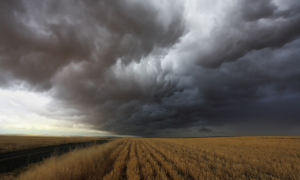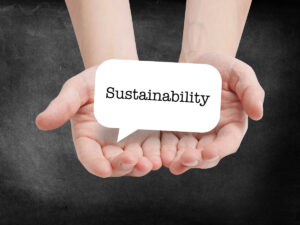Historically countries have ignored environmental concerns in their race to develop their economies. Some analysts have argued that it is only after countries achieve a certain level of prosperity that they begin to show concern for the environment. For example, W. Beckerman, in 1992, concluded “in the end the best – and probably the only – way to attain a decent environment … is to become rich.” A more recent study [2004], by Rachel A. Bouvier [Air Pollution and Per Capita Income] concludes:
“While pollution levels may have declined after some turning point in some developed countries as per capita income grew, this does not necessarily imply that the same can or will occur in developing countries. … To be sure, there is evidence that as a country develops, the share of its manufacturing sector in GDP falls and democracy strengthens. Both of these contribute to reductions in emissions. But these effects have not been sufficiently strong to offset the scale effect in carbon dioxide and volatile organic compound emissions. Moreover, as Arrow et al. (1995) caution, if the developing countries cannot follow the ‘clean growth’ trajectory that ostensibly has characterized the developed nations, then becoming richer may not improve their environmental quality. The findings reported here suggest that environmental improvements are especially unlikely if the growth process is heavy on manufacturing and light on democracy.”
One thing is more certain, when pollution begins affecting the quality of life that increasingly affluent people enjoy, they pay attention and start demanding that their political leaders do something about it. China, which falls squarely in the “heavy on manufacturing and light on democracy” sector, is nonetheless experiencing a bit of a “green awakening” according to an article Ariana Eunjung Cha [“In China, a Green Awakening,” Washington Post, 6 October 2007].
“One morning this summer, residents [Wuxi] awoke to find that their beloved Tai Lake had turned rancid. The water was filled with a bloom of blue-green algae that gave off a rotten smell. It was not only undrinkable; it was untouchable. Few living things stirred in the water. For almost three decades, the city had welcomed some of the world’s biggest polluters. Churning out paper, photographic film, dye, fertilizer, cement and other products for the global marketplace, the businesses helped make Wuxi into one of China’s wealthiest industrial cities. They also poisoned the province’s vast network of lakes, rivers and canals. In late May, when the toxic sludge reached Tai Lake, which is the main source of potable water for Wuxi’s 5.8 million residents, people turned on their taps and got only sludge. City officials decided they’d had enough. In a series of radical proclamations that sent shudders though the business community, Wuxi declared itself a newly reformed green city. … In late May, the algae in the lake grew so fast that taps all over the city spewed dirty water. While most algae are harmless, the chemical runoff from factories had fattened the algae in Tai Lake into a toxic muck poisonous to humans and aquatic life. According to residents interviewed later, consumers panicked, and the price of large bottles of water jumped from $1 a bottle to $6. People couldn’t clean dishes, couldn’t wash their clothes, couldn’t shower.”
The most impressive thing was not that city fathers made proclamations, but that they acted, and those actions received accolades from Beijing. Even so, questions remain about whether the actions mark a new permanent path toward environmental cleanup.
“By September, the city had closed or given notice to close more than 1,340 polluting factories. Wuxi ordered the rest to clean up by June or be permanently shut down. The actions were applauded by Chinese Premier Wen Jiabao, who has vowed to use economic incentives and punishments to aid in environmental protection and resource protection. Last week, China’s State Council approved an environmental plan that includes reducing major pollutant discharges by 10 percent by 2010. Plagued by water shortages, choking on dusty air and alarmed by a sharp increase in pollution-related diseases and deaths, China has been searching for years for a way to fix its environment without hurting its economy. China has closed vast swaths of polluting factories in the past, only to reopen them when unemployment rose too high.’
At least some pundits, according to Cha, believe that this new green awakening is for real.
“Elizabeth Economy, a fellow at the Council on Foreign Relations and author of ‘The River Runs Black: The Environmental Challenges to China’s Future,’ said this time ‘the commitment, the profile, the energy behind the state’s environmental protection efforts far exceeds anything we’ve seen in China’s history. It’s not about new ideas, but about enforcement. … What is changing are the incentives or disincentives.’ On the other hand, Economy said, it remains to be seen whether local officials will follow the central government’s lead. ‘They have never had the bottom-up pressure that makes them change their practices, nor a top-down mechanism for providing the right incentive to make it easy to do the right thing,’ she said. This year, some cities are taking measures that show that their officials are beginning to make the environment a higher priority than raising the gross domestic product, a fundamental shift in thinking for a country that can attribute much of its early development to being the place to which others outsourced their pollution.”
Cha discusses the path that led to Wuxi’s prosperity and to its pollution problem. It’s an interesting journey since it serves as a caution for politicians and businessmen alike who are willing to pursue myopically economic growth without any consideration for the environment. In the end, this unbalanced strategy makes little economic sense since cleaning up the environment doesn’t come cheap.
“Wuxi was one of the regions targeted under Deng Xiaping’s ‘opening up and reform’ industrialization push in 1978. The area, once known as the ‘land of fish and rice,’ was transformed into the heart of China’s chemical industry. Its economy ballooned from 2.5 billion yuan in 1978 to 330 billion yuan (about $44 billion) in 2006 — bigger than that of Ecuador or Luxembourg. Now China’s sixth-largest industrial city, Wuxi produces chemicals sold to the United States and other countries. It has a downtown of closely packed, dusty high-rises and is surrounded by idyllic countryside dotted with gargantuan factories spewing black smoke. Half the population is employed by the 5,300 factories with annual sales of at least $650,000 each. As Wuxi’s economy grew, so did the pollution in Tai Lake, for centuries one of China’s most picturesque lakes.”
Although the algae bloom appeared almost overnight, warning signs had been appearing for years.
“As early as the 1990s, Wu Lihong, 39, a former sales manager for a factory, warned officials that the city was headed toward ecological disaster if it didn’t shut down polluting factories. … By 2003, it was clear the lake was sick, and the government banned fishing there. … Wang Guoxiang, director of the Research Center for Eco-Environmental Sciences at Nanjing Normal University in Jiangsu province, said government engineers tried every scientific alternative possible, spending more than $1.3 billion to try to save the lake. They dug up the silt and replaced it. They poured fresh water into the lake and redirected rivers to try to wash the pollution away. They even seeded clouds to create rain to dilute the polluted water. But it took a crisis to force the government to start closing companies.”
In addition to closing polluting companies, the city decided to take other steps as well.
“Gong Pin, deputy director of the Wuxi Economic and Trade Commission, said that the first stage of the factory closings targeted small chemical companies but was only the beginning. ‘Our aim is to call attention and supervision from the society,’ Gong said. The government also will require companies to move from populated urban areas to special industrial zones at their own expense, he said. Wuxi’s environmental campaign has been held up as an example of how cities should deal with polluters.”
That would be a great ending to the story, but unfortunately, that’s not the case. Something quite unexpected is happening.
“Instead of shunning the polluting companies in Wuxi, delegations from other parts of China have been coming to Wuxi to invite them to come to their cities. ‘This is impossible to understand,’ said Wang of Nanjing Normal University. ‘We keep telling them they are just moving pollution around and it isn’t good for them, good for China.'”
If one considers Abraham Maslow’s hierarchy of needs, this reaction is quite understandable. Not all parts of China enjoy the same level of prosperity as Wuxi. Those areas are desperate for jobs, desperate for infrastructure, and desperate to achieve their dream. Attracting businesses unwanted elsewhere is the quickest way to reach the next level of “need.” Until governments make it clear that polluting is less profitable than operating as a so-called “green” company, businesses will continue to damage the environment and regions looking to become more prosperous will continue to welcome them (and will later come to regret that decision).




